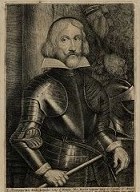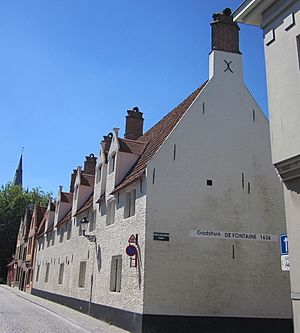Paul-Bernard de Fontaines facts for kids
Quick facts for kids
Paul-Bernard de Fontaines
|
|
|---|---|
 |
|
| Born | 1566 |
| Died | 19 May 1643 (aged 77 or 76) Killed at the Battle of Rocroi |
| Allegiance | Spain |
| Service/ |
|
| Years of service | 1596-1643 |
| Rank | Maestre de campo |
| Battles/wars | Eighty Years' War Thirty Years' War |
Paul-Bernard de Fontaines (born in 1566 in Lorraine, died May 19, 1643, in Rocroi) was an important military leader for Spain. He was also known by names like Comtefontaine, Conde Fontana, or Fuentes. He led the Spanish infantry during the Eighty Years' War. He also served as the Vogt (a type of local ruler) of Bruges and governor of Damme. He took part in several battles, including those near Hulst, Kallo, and Antwerp.
Contents
Paul-Bernard de Fontaines' Early Life and Career
Paul-Bernard de Fontaines had a tough start to life. Both his parents, Francisco de Fontaine and Suzanne d'Urre, died before he turned one year old. His grandfather, Jean d'Urre, took care of him.
In 1596, Paul-Bernard decided to join the King of Spain's army as a volunteer. This was the start of his long military career. By 1597, he became an infantry captain. In 1604, he was promoted to cavalry captain. Then, in 1611, he became a military commander in Flanders.
Building the Fontaine Line
A twelve-year truce (a time of peace) ended in 1621. After this, Paul-Bernard de Fontaines oversaw the building of many fortresses. These forts stretched from Knokke to Lapscheure. This line of defenses later became known as the Fontaine line.
In 1631, he was in charge of the Spanish troops. He successfully broke through the Siege of Bruges by Frederick Henry, Prince of Orange. Throughout his career, Fontaines was known more for being a good organizer and administrator than a battle strategist.
Helping Soldiers and the Community
In 1636, Paul-Bernard de Fontaines and his wife, Anna de Ragicourt, did something special for soldiers. They created a chapel and an almshouse (a place for poor people to live) in Bruges. This almshouse was for twelve soldiers who had become poor.
You can still see his family's coat of arms above the door of the building. This building was used until 1914 and is now a historical monument. He also donated a main altar to the St. Walburga church in Bruges, which also featured his coat of arms.
Final Battle and Legacy
In 1638, Paul-Bernard de Fontaines was given the important title of Maestre de campo. This meant he was the commander of the infantry. By this time, he was already quite ill. He was barely able to perform his military duties.
At the Battle of Rocroi in 1643, he was so sick that he had to command his soldiers from a special chair called a sedan chair. He died during this battle. He was later buried in a monastery church. However, that monastery and church were torn down in 1796.
See also
 In Spanish: Paul-Bernard de Fontaine para niños
In Spanish: Paul-Bernard de Fontaine para niños
 | Emma Amos |
 | Edward Mitchell Bannister |
 | Larry D. Alexander |
 | Ernie Barnes |


